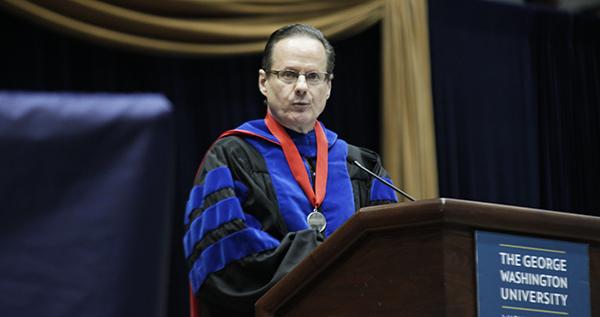This is the fourth in a series of profiles on GW’s 10 deans.
Michael Brown has spent the past nine years cultivating a school in which students can network and faculty can conduct research without having to worry about a loss in funding or cuts to programs.
As GW’s longest-serving dean, Brown has become a fixture among the ever-changing list of school leaders. And at the Elliott School of International Affairs graduation ceremony Friday, Brown reminded students how the school stands out from the rest.
But the Elliott School, which has earned a national reputation and maintained high rankings, will see more competition for funding and popularity in coming years as the University invests in areas where GW has historically been lacking.
Once the $275 million Science and Engineering Hall – the University’s largest academic investment to date – opens up next year, GW’s engineering programs could rise faster than its international affairs departments for the first time in a decade.
And with the initial $25 million investment in the Corcoran Gallery and College of Art + Design, GW’s finances will be spread thin. Some faculty and administrators fear that the Elliott School could take a hit as GW shifts its priorities to other fields.
Brown will lead the school as it looks to continue to succeed amid this change, and he’s gained the support of faculty who trust he will keep the school competitive.
The former director of Georgetown University’s Center for Peace and Security Studies, Brown said he will focus on continuing to improve the school’s rank, which was ninth for undergraduate and seventh for graduate programs in Foreign Policy magazine two years ago.
“We’re a top-10 school and our goal is to be tied for first place,” Brown said. “I think we’re seen as one of the leading schools of international affairs on this planet. So in terms of our academic goals, that’s stayed the same, it hasn’t gone up because you can’t go up. And we’re definitely not going down.”
Since coming to campus in 2005, Brown has doubled the number of research institutes in subjects that have come to prominence in the field of international affairs, such as the Institute for Middle East Studies.
Brown said he hired about twenty new faculty members over the past nine years – while maintaining relatively the same number of students – which means students are better able to connect with professors to discuss research.
He had extensive experience in international affairs before taking the reigns at the Elliott School. The 60-year-old, who earned his Ph.D. in government from Cornell University, has edited or co-edited 21 books and is the winner of the Edgar Furniss National Security Book Award for a book about bomber planes during World War II.
Maurice East, who was dean of the Elliott School from 1985 until 1994 and now serves on the Elliott School advisory board, described the school as “the jewel in the crown” of GW. But East said he fears that the program could fall by the wayside as other programs grab more of the University’s attention.
“As the saying goes, ‘The squeaky axle gets the grease,’” East said.
Hope Harrison, an associate professor of history and international affairs and former director of the school’s institute on European, Russian and Eurasian Studies, said she was drawn to the school fifteen years ago because of its rising reputation.
“Everyone in Washington, when they found out I was there, they would go, ‘Oh, that place is so great. That place is really on the upward trajectory,” said Harrison, who is on leave this year.
Robert Sutter, professor of practice of international affairs, who also worked with Brown at Georgetown’s School of Foreign Service, said Brown continuously encourages faculty to improve the program.
“It’s very challenging and lots of things are going on and so it’s very constructive and broadening and enlightening,” he said.







